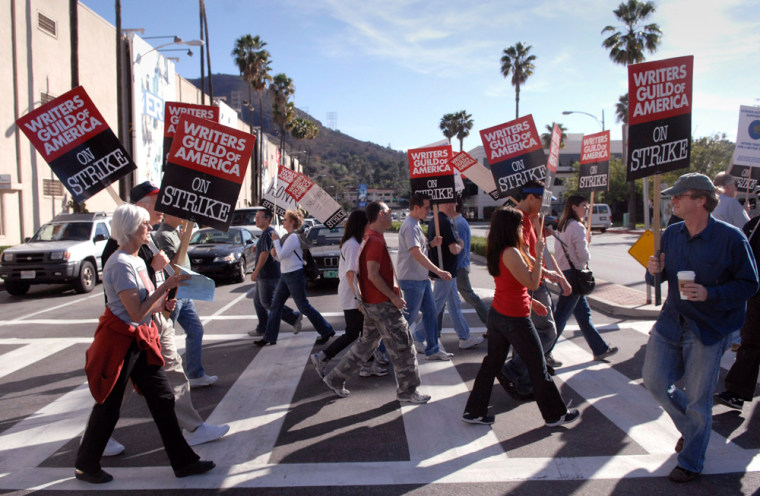Now that the Directors Guild of America has reached an accord with Hollywood studios, the striking writers have returned to the bargaining table in the hopes of pounding out an agreement with the studios.
A settlement won’t come a moment too soon for those affected by the walkout.
“The writers’ strike is having a much larger economic impact on L.A. than its direct impact on writers and studios,” said former Secretary of Labor Robert Reich. “The L.A. economy revolves around entertainment, and entertainment depends to a large extent on entertaining scripts. Without the latter, the entire economy becomes more fragile.”
Opinions vary as to whether the 11-week-old writers’ strike has had a seismic or modest effect on the Los Angeles economy. Jack Kyser, chief economist for the Los Angeles Economic Development Corp., estimates that to date the strike has resulted in a $1.5 billion hit to the local economy. But a forecast put out by the UCLA Anderson School of Management suggests that the number is much lower — an estimated loss of $380 million if the strike lasts until March — and that several factors will offset the impact of the work stoppage.
Whichever big-picture estimate is embraced, there are human costs that have quickly trickled down. Kate Biscoe is a makeup artist who has worked on such recent feature films as “Memoirs of a Geisha” and “Factory Girl.” Because she often serves as a department head on productions, she gets frequent phone calls from “day checkers,” makeup artists who inquire about day work, especially for period films and big crowd scenes.
“It’s been pretty dead,” Biscoe said. “A lot of people are calling me looking for work. I get a call or two a day. They need the hours so they can keep their health insurance.”
Sue Cabral-Ebert, president of Local 706, which represents hair stylists and makeup artists, said she has heard from many members having a difficult time accumulating the 300 hours needed every six months to qualify for health insurance. But that’s just one area of pain, she explained.
“People are scared and angry,” she said, “and some will be losing their houses soon.”
Biscoe pointed out that some makeup artists earn an entire living just during awards season. Actors and actresses need makeup artists not just for shows like the Golden Globes and the Oscars, but also for many related public appearances.
“They can get 15 days of work doing press and parties with an actor, which is a huge amount of money to a makeup artist,” Biscoe said.
Sharon Lazarow works in sales for a company called Under The Sun Promotions, which distributes promotional merchandise for movies and television shows and lists Paramount and Fox among its major clients, although it does business with all the studios. It’s a small firm with 12 employees based in Encino, Calif., and because everyone works on commission, there has not been talk of layoffs.
“I would say our business is down about 30 percent,” she said.
Some of the shows that Under the Sun was supposed to work on have been cancelled. One of the company’s biggest clients, E! Entertainment, did not require as much in the way of lower-end goodie bags — red carpet “emergency kits” that include lipstick, tape to hold dresses together, etc. — because there was far less red carpet activity.
The Los Angeles Economic Development Corp. is a private, non-profit organization that provides research and consulting to media, government and private businesses. It estimates that the cancellation of the Golden Globes alone cost the area economy about $60 million, which includes lost revenue for hotels, restaurants, transportation services, party venues and more.
“The damage is spreading beyond industry specific areas,” Kyser said. “It’s spreading into the greater economy.”
Kyser pointed out that his organization’s data for the current strike covers all of Los Angeles County. “Right now, the wage loss by members of the Writers’ Guild and allied unions comes in at just below $553 million since the strike started,” he said. “If you then apply a multiplier, these people are not out spending, that’s where we get the $1.5 billion figure. These people earn a lot of money when they’re working.”
The UCLA Anderson Forecast, headed by economist Jerry Nickelsburg, suggests the strike will be far less damaging to the local economy. The primary reason for that conclusion is the stockpiling of scripts by studios, which led to an acceleration of production leading up to the strike that helps compensate for the absence of new films and shows. That acceleration also includes a spike in hiring, according to the UCLA study.
Kyser’s response to the UCLA study: “I think he underestimated.”
“In TV, there isn’t much of a stockpiling of scripts,” Kyser added. “Plus he assumes that reality shows that don’t need scripts will fill the void.”
Clearly, there are many ways to interpret the same economic event. But the anecdotal evidence that the writers’ strike is painful keeps mounting. Lazarow offered a personal example of how even those not directly connected to the industry have felt the impact.
“My husband is a landscape architect,” she said. “He went to one client recently who is a key grip. The client said he’ll have to hold off on a project my husband was going to do until the strike is settled.”
